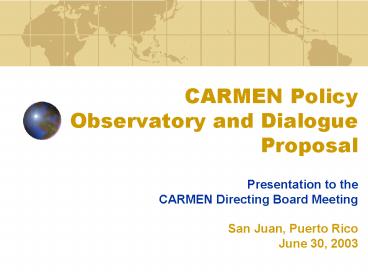CARMEN Policy Observatory and Dialogue Proposal - PowerPoint PPT Presentation
1 / 22
Title:
CARMEN Policy Observatory and Dialogue Proposal
Description:
Community. Health Services. 4. CARMEN as a ... Why a Policy Observatory for Latin America and the Caribbean? Common NCD Policy Challenges across the region ... – PowerPoint PPT presentation
Number of Views:25
Avg rating:3.0/5.0
Title: CARMEN Policy Observatory and Dialogue Proposal
1
CARMEN Policy Observatory and Dialogue Proposal
- Presentation to the
- CARMEN Directing Board Meeting
- San Juan, Puerto Rico
- June 30, 2003
2
Key Challenges for CARMEN
- Bring NCD prevention to the forefront of the
discussion on social and economic policy
development - Facilitate and support national NCD policy
3
CARMEN as an Action Oriented Initiative
- Main levels of action for a public health
approach for NCD - Policy
- Community
- Health Services
4
CARMEN as a repository of intervention knowledge
- Focus on evaluation
- Pool and wealth of intervention knowledge at the
3 levels of action - To be further evaluated and exploited
- Learning about good practices
- Potential Platform for NCD Policy Research
- Provides access to expertise in policy research
and to channels for NCD delivery of policies and
programs among countries.
5
CARMEN as a Network
- Readily available dissemination channel on
lessons learned among countries - Case stories from demonstration areas can be
used - To raise visibility / profile
- To obtain political and public support
6
Roadblocks facing CARMEN
- Lack of political support for NCD prevention
- Less than 50 of WHO Member States have
established national NCD prevention policies and
plans - Less than 40 for the Americas
7
Ref Assessment of National Capacity for
Noncommunicable Disease Prevention and Control.
WHO 2002
8
(No Transcript)
9
- Health Canada, through its WHO Collaborating
Centre on NCD Policy facilitated 2 comparative
studies (1994 and 2000) on policy development and
implementation processes. - 27 CINDI countries and 3 CARMEN countries
participated - Results provide useful guidance on policy gaps
and challenges
10
Some key findings Strategic issues to be
addressed by CINDI/CARMEN
- Increased focus on population approaches
- Better marketing of NCD programs
- Case studies should be better exploited as
advocacy tools - Challenge of moving from demonstrations to
countrywide, and to integrate into national
health systems - Untapped opportunities for CINDI and CARMEN as
research observatories for best practices - Potential of CINDI and CARMEN as linkage agents
with other health promotion and disease
prevention initiatives.
11
CARMEN Policy Observatory ProposalJoint
initiative between the WHO Collaborating Centre
on NCD Policy (Canada) and PAHO
12
Building on investments and experience to date
- WHO Collaborative Centre on NCD Policy
- Prior policy comparative studies
- Qualitative research expertise
- Ongoing NCD policy working group for CINDI
centres.
13
Policy Observatory for Latin America and the
Caribbean
POTENTIAL PARTNERS AIM
- Provide a knowledge base and analytical support
to policy-makers - Comparative NCD policy analysis
- Bridge between evidence and policy makers needs
- Develop tools and practical recommendations
- PAHO / WHO
- Centre for Chronic Disease Prevention and
Control - Member States
- Academic Institutions
- NGOs
14
Why a Policy Observatory for Latin America and
the Caribbean?
- Common NCD Policy Challenges across the region
- Scarce evidence on the actual effectiveness of
NCD policies - Ideology-rich but knowledge poor
- Available information lacks relevance for
policy-makers and agencies
15
Goals of the Observatory
- Support and promote evidence-based health policy
making through comprehensive analysis of NCD
policy development and implementation processes - Expand the necessary technical capabilities for
NCD policy analysis and evaluation in the Region
to provide evidence base to support decision
making process - Bring NCD prevention at the forefront of policy
discussions and increase visibility and political
support
16
Key Objectives
- To facilitate the introduction of policies for
the prevention of NCDs in government and social
development programs - To technically improve the formulation and
implementation of NCD policies - To boost technical capacity in the countries
- e.g. analysis and evaluation of public policies
for the prevention of NCD in Latin America and
the Caribbean
17
Key Objectives
- To generate relevant information for the design,
formulation, and implementation of public
policies for the prevention of NCDs - To adopt and adapt methodologies for policy
analysis in the Region to facilitate their
frequent use in decision-making - To promote the formulation of policies that
advocate NCD prevention in the Region - To facilitate technical cooperation among
countries
18
MONITORING
CLEARING-HOUSE
NCD POLICY OBSERVATORY
TRAINING
DISSEMINATION
POLICY ANALYSIS
19
Activities - Products
- Country Information Monitoring
- NCD Policy Profiles for Countries in the Region
- Clearing-house
- Collection and classification of scientific and
grey information on key policy issues and
individual country experiences
20
Activities - Products
- Analytical studies on NCD Policies
- Cross-country sub regional comparisons through
case studies and qualitative research - Dissemination Activities
- Websites
- Publication
- Policy forums
- Training
21
A First Step
- Case studies of
- Public policies aimed at prevention and control
of the most important risk factors for NCDs such
as smoking, nutrition and physical inactivity - Establishment of a technical working group with
interested countries - Timetable
- Completion of case studies by end of 2004
22
The Next Steps
- Expand to other networks e.g., CINDI
- Additional themes for analysis
- Dissemination, publications, web- based tools
- Policy dialogues / forums































